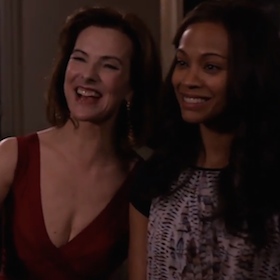'Rosemary's Baby' Miniseries: Solid Actors Try To Save Lifeless Script

2/5
Remakes and reimaginings are apparently the lifeblood of Hollywood these days. While some succeed, most falter, and Rosemary’s Baby certainly does the latter. This version – based more on Roman Polanski’s 1968 film than Ira Levin’s novels – seeks more to update than add anything new to the franchise.
The concept is virtually unchanged: Guy (Patrick J. Adams) and Rosemary (Zoe Saldana) are an attractive young couple struggling financially. The only changes to the story are that they are now an expat couple starting new lives in Paris as opposed to New York, and in this version, the couple has recently suffered a miscarriage. Adams and Saldana have a natural chemistry throughout; they’re young lovers that are hungry for each other and are trying everything they can to keep their interactions airy so they don’t have to deal with their feelings about Rosemary’s miscarriage or their growing money problems.
The other couple in this is Roman Castevet (Jason Isaacs) and Margaux Castevet (Carol Bouquet), who are pushy but well connected, and apparently very generous. It’s also here that the miniseries finds its strength: the performances. The two couples share a great deal of scenes together, mostly setup and exposition sprinkled in with hints of character, but the actors attempt to live their roles and make the characters seem more alive than they really are, lifting up the script that is, despite its overlong runtime, decidedly spare.
Zoe Saldana (who helped produce the film) is a particular standout here. The film is really a demo reel for her, playing a wide range of emotions varying from fear to lust, sometimes within moments of each other, and if you take a step back, you can see this project could very well have been Saldana’s attempt at showing the world that she is a capable actress and not just a pretty face in action movies. She does her best to make the most of the role, and the scenes in which she is at the center tend to be the best ones. She quietly works through facial expressions and eyes, attempting to compensate for the usually plain and stating-the-obvious dialogue.
The other standout is Jason Isaacs, who is in much of the same boat as Saldana. He very well could have hammed his rendition of Castevet up to eleven, but chose an undeniable suaveness with underlying menace, often speaking directly but meaning something else. Unfortunately, he has little to do in the script, and for some unfathomable reason he’s given a very large earring to wear, which on a man of fifty screams midlife crisis, not mysterious. If anything, seeing Isaacs here just makes you resent NBC for cancelling Awake.
Of course, an actor can only do so much. They tend to need solid work to draw from, and the script ultimately fails its actors. Much of “Night One” is padded to meet its runtime. There is a central mystery that Saldana’s Rosemary becomes involved in because the plot requires it. All this started because she was mugged by a pedestrian who was hit by a car and escaped, but she manages to retrieve the wallet of another woman the criminal mugged. Rosemary returns the wallet to the woman, Margaux Castevets, who happens to be a socialite witch who could kill a man with a prayer but can’t teleport her wallet back to her. They become friends and eventually, the Castevets become landlords to Rosemary and her husband. And at one of these major parties, Rosemary manages to meet and befriend the Commissioner of police who is willing to take Rosemary’s ‘bad feelings’ as evidence, which leads to a priest who has more information than Google and has remained silent about this for decades because…because then we wouldn’t have a miniseries then, would we?
It doesn’t help that much of script requires not only an extreme amount of suspension of disbelief, but also asks you to not think on the obviously dumb mistakes of its characters. Rosemary and Guy trust the Castevets yet do not question the sudden windfall in their lives, or the absolutely ridiculous coincidences: the Castevets have clothes that are specifically tailored for the young couple, make all of their dreams come true due to their “connections,” come and go as they please in the couple’s apartment and treat them with holistic medicine. Furthermore, the couple ignores the creepy furtive stares of the Castevets and fails to question how they are always around when something important or odd happens. They’re in my apartment with a tongue-less repair man fixing a fireplace that doesn’t exist? Normal! Perfectly fitting clothes after having met them only once? Great! Constantly wearing black? Thinning! Waiting for me with a car as I come out of work? Thoughtful! Staring at me and nodding from a corner right after my only competition for a great job kills herself bloodily and publically? Well, that’s what friends are for!
This doesn’t even cover expository and often ridiculous dialogue – “You’re my muse,” “They’re Satanists. They worship Satan,” “This isn’t a dream…it’s real!” You don’t say.
The miniseries was written by James Wong (Final Destination, The X-Files) sans frequent collaborator Glen Morgan. Instead, Wong is joined by Scott Abbott who penned the Queen of the Damned adaptation in 2002. Neither of the writers is new to the horror or thriller genre, yet in the first two hours, there isn’t even anything remotely scary. There are just a few (admittedly impressive) scenes of gore, a few dreams and psychic premonitions rendered poorly in CGI and a vaguely Roman orgy edited for a prime time audience on network TV.
The longer this first part ran, the less it could justify its run time. Rosemary does not actually get pregnant with eponymous baby until the closing minutes of “Night One.” I wouldn’t have minded this so much if the preceding hour and fifty-seven minutes contained actual content. Had “Night One” been streamlined down to run an hour, and had a script doctor gone over the dialogue, the results might have been a tighter, more interesting product rather than what it is: a reminder of the 1998 remake of Psycho.
Rosemary’s Baby concludes Thursday at 9 p.m. on NBC.
RELATED ARTICLES
Get the most-revealing celebrity conversations with the uInterview podcast!





Leave a comment